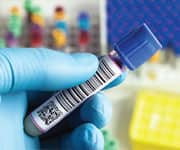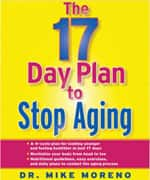Life Extension Magazine®

In 2011, Dr. Mike Moreno’s weight loss book, The 17 Day Diet, was a bestselling phenomenon. It spent eleven weeks at #1 on the New York Times bestseller list and has more than 900,000 copies in print today. For his next book, Dr. Moreno chose to tackle a subject that Life Extension® members know a great deal about: anti-aging.
In this exclusive interview, Dr. Moreno talks to Life Extension about the five factors of aging, some novel ideas he presents in his book, and his unique approach to the patient/doctor relationship.
LE: The first chapter of your book deals with what you term “the five factors of aging.” Can you briefly explain what they are?
MM: Absolutely. Inflammation is the first factor. The other factors of aging include methylation, oxidation, glycation, and immune impairment. Generally, most people classically think of inflammation as having to do with arthritis, but they fail to realize that inflammation itself underlies the major diseases of aging.

LE: Inflammation is thought to be connected to everything from Alzheimer’s to heart disease. And you mention in your book a few things that can cause inflammation.
MM: A number of lifestyle factors contribute to inflammation and thereby to aging. Some of the most obvious (but least controlled in our population) are smoking, lack of exercise, excess weight, and too much stress. All of these are potential killers. It’s a message you hear from everyone, but for some reason, people refuse to make preventive changes in their life.
LE: All of those issues seem to be brought on by poor lifestyle choices.
MM: Exactly. Prevention is the key to longevity. It is much better to treat a person who is well than a person who is sick. On that note, oxidative stress is another of the factors of aging. Oxidative stress is what takes place when you have unstable molecules orbiting around in the body. Rust on iron is oxidation. From a molecular standpoint, it’s a result of these unstable molecules that wreak havoc on every organ in the body. However, a lot of oxidative stress can be prevented by a diet rich in antioxidants.
LE: Aside from its role in oxidation, the diet plays a big role in glycation, another factor of aging, doesn’t it?
MM: Yes. Glycation is a result of the interaction between the types of proteins and carbs that we eat. Glycation occurs when sugars react with the body’s lipids or proteins, resulting in the formation of non-functioning advanced glycation end products. Although glycation is a normal consequence of the aging process, it is far from desirable. Glycated white blood cells are unable to fight infection as well, meaning you’ll get sick more often. Portion control is also a factor in avoiding harmful glycation. Too much of a good thing can also be a bad thing. When you talk about something normally thought of as healthy, like fruit, you have to remember that in terms of a diabetic, it can be harmful. There is so much people can do through their diet to modify the risk of glycation.

LE: Speaking of getting sick, you list immune impairment as one of your factors of aging as well, next to methylation. Can you explain these two concepts?
MM: Innate immunity is our first line of defense in the war against infection. As we get older, it seems that our innate immune cells don’t communicate as well as they once did. This impairment applies to everything in our body. With an impaired immune system, we open the door for more degenerative diseases and tend to age faster. Methylation primarily has to do with DNA. It’s DNA driven. It’s a template for every cell in our body. When it’s occurring correctly, methylation keeps your DNA in good working condition, therefore proper methylation can actually slow down aging when it’s balanced.
LE: What role does diet, vitamins, nutrition, and supplements have in fending off aging?
MM: When I think about natural immunity, I think about vitamins B6 and B12. I recommend a multi-vitamin. Vitamins A, D, E, and C are extremely valuable. Occasionally, one vitamin will be highly touted and then the skeptics will come out and declare that something might not be as helpful as we might have thought. That bothers me. If something helps, in any way, it is worth taking because these things really are critical. As for what foods are best, vegetables in any amount are always going to be fine. Across the board, lean proteins, fish, chicken, and poultry are all valuable. Whole grains are good, but too much can still serve as a source of increase in your blood sugar, which isn’t good.
LE: This is a good time to talk about the dangers of glucose, which you mention throughout your book.
MM: The main thing that people have to remember is that they should be cautious of their sugar intake. And it’s not just about cakes and pies. Fruit is not always your friend. I take lots of criticism from dieticians about limiting fruit. When you look at the diabetic issues that plague us all as we age, and you see children with type II diabetes, you know we have a problem with sugar in general. The problem is that no matter how it gets there, once sugar is in the blood, it goes everywhere because the blood goes everywhere. If sugar is delivered via the blood to every organ, then the oxygen is crowded out and that damages the process of oxygen delivery to vital organs. This affects your kidneys, your heart, strokes, neuropathy, your eyes, almost everything. Excess sugar in the blood is something people really need to look out for.
LE: Most people would like the energy of youth as well. In what way is the thyroid overlooked in this function and how can we keep it healthy?
MM: There are many issues that can develop with the thyroid, but the most common is hypothyroid, which is an underactive thyroid. It is estimated that 27 million American adults have an underactive thyroid, and the best way to know is to have your thyroid checked with a blood test. If you do that, then you need to watch for symptoms, which are sometimes subtle, including lethargy and sudden weight gain. If you suffer from this condition, get plenty of calcium and vitamin D and make sure you consume enough iodine.
LE: We’ve gone into some specifics thus far, but what is the overarching theme of the anti-aging strategies in your book?
MM: The book’s focus is to slow down the aging process. I try to distinguish the process of aging from the process of getting older. How we get older and how our organ systems get older is what we can help control. To make those systems healthier is not as difficult as people think it is. Once you make those systems healthier, your whole body becomes healthier and you live longer.
LE: America is no longer one of the healthiest countries in the world and we are plagued by epidemics of heart disease, cancer, diabetes, and obesity. How can the doctor/patient relationship help change that?
MM: It’s sad but true that people are unhealthier now than they’ve ever been in this country. We have made so many advances in science and technology and we’re still unhealthy. I think part of the problem is that the vast majority of patients need to take personal responsibility for their health. As physicians, we need to make sure we treat each patient differently based on their needs. Medicine should not be a “one size fits all” business. You can’t just tell someone they need to start walking 30 minutes a day. That might not work for them.
LE: How do you personalize a patient’s visit in your own practice?
MM: One of the first things I have a patient do is walk me through their typical day. Tell me about everything you do from the moment you get up until you go to bed. Then walk me through the week, or even two weeks. I often have patients keep a journal of a few weeks to record their eating and activity habits. Once I see that journal, we can identify the problems and work through it and come up with a program that works specifically for them.
LE: What are some general strategies that you have for patient improvement?
MM: The simplest thing I advise is for patients to get their blood work done regularly. I literally beg my patients to come in and get their blood work. It’s amazing how much prevention people pass up because of fears that can be resolved or treated with the right blood test. Like I said earlier, prevention is the key to longevity.

LE: Thank you for your time, Dr. Moreno.
MM: Thank you.
If you have any questions on the scientific content of this article, please call a Life Extension® Wellness Specialist at 1-866-864-3027.
Dr. Michael Moreno, better known as “Dr. Mike,” is a graduate of the University of California at Irvine and Hahnemann Medical School (now Drexel University). Following his residency at Kaiser Permanente in Fontana, California, Dr. Mike moved to San Diego, where he now practices family medicine and sits on the board of the San Diego Chapter of the American Academy of Family Physicians.
To obtain a copy of The 17 Day Plan to Stop Aging by Dr. Mike Moreno, please visit www.amazon.com.

